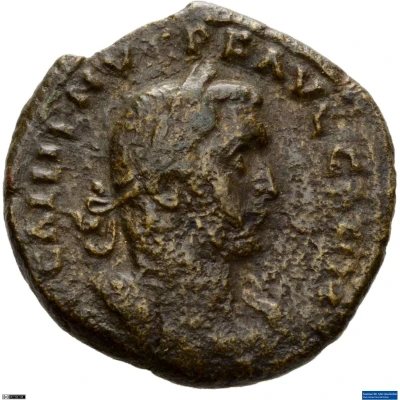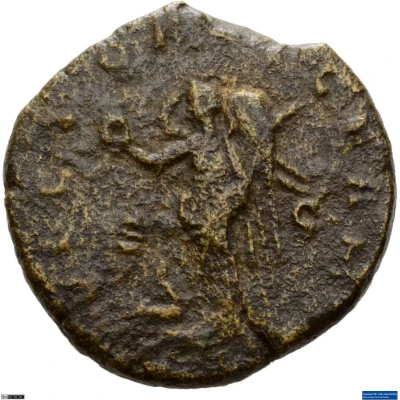


© Münzsammlung des Seminars für Alte Geschichte, Albert-Ludwigs-Universität Freiburg (CC BY-NC-SA 3.0 DE)
Sestertius - Gallienus VICTORIA GERM S C; Victory
| Bronze | 11.9 g | 24.5 mm |
| Issuer | Rome › Roman Empire (27 BC - 395 AD) |
|---|---|
| Emperor | Gallienus (Publius Licinius Egnatius Gallienus) (253-268) Valerian (Publius Licinius Valerianus) (253-260) |
| Type | Standard circulation coin |
| Years | 257-258 |
| Value | Sestertius (⅛) |
| Currency | Antoninianus, Reform of Caracalla (AD 215 – 301) |
| Composition | Bronze |
| Weight | 11.9 g |
| Diameter | 24.5 mm |
| Shape | Round (irregular) |
| Technique | Hammered |
| Demonetized | Yes |
| Updated | 2024-10-05 |
| Numista | N#286872 |
|---|---|
| Rarity index | 100% |
Reverse
Victory, winged, draped, standing left, holding wreath in right hand and palm in left hand; at her feet, captive.
Script: Latin
Lettering: VICTORIA GERM S C
Translation:
Victoria Germanica. Senatus Consultum.
Victory over the Germans. Decree of the senate.
Comment
Mass varies: 2.19–18.1 g;Diameter varies: 19–29 mm;
Example of this type:
Münzsammlung des Seminars für Alte Geschichte, Albert-Ludwigs-Universität Freiburg
Source:
Online Coins of the Roman Empire (OCRE)
Interesting fact
The Sestertius coin features an image of Victory (Victoria) on the reverse side, which was a common motif on Roman coins during the reign of Gallienus. This was because Victory was seen as a symbol of the Roman Empire's military prowess and dominance. In fact, the Latin inscription "VICTORIA GERM S C" on the coin translates to "Victory of the Germans," suggesting that the coin was issued to commemorate a military victory over the Germanic tribes.